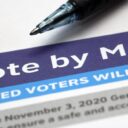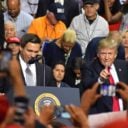In 2012, Mitt Romney won independent voters by 5 percent over Barack Obama, but still lost the election. But this has hardly diminished their importance in the eyes of pundits and politicians. And rightfully so, because independent voters are an essential bloc, that is, if you can get them to vote in substantial numbers, which among other mistakes made was what Romney failed to do.
However, there has been some interesting data research conducted by Micah Roberts of the Republican polling firm, Public Opinion Strategies. Roberts, who works at a partisan firm, has been compiling data from years worth of NBC/Wall Street Journal polls, which are conducted by both Democratic and Republican firms in collaboration. He gathered all of the monthly information on independents for the years 2010, 2012 and 2013, giving him a statistically significant group makeup of independents in each of those years.
The results of the data shine a ray of optimism on a party increasing negative about the future electoral prospects of their candidates. Roberts focused on congressional preference, which tends to give a broad picture of voting behavior, but useful in an apples to apples comparison. In other words, at this point, I would view the data with a grain of salt on the presidential level, if that.
However, as it relates to upcoming midterm elections, the Republican Party may have a greater opportunity to retake the Senate and dominate House races than some may believe.
For instance, in 2013, independent voters tilt more heavily Republican on their congressional preference than they did in 2010, when Republicans picked up 63 seats to retake control of the House. In 2010, 40 percent of independents said that they preferred a Republican-controlled Congress, while just 26 percent said they wanted a Democratic-controlled Congress. In an NBC-WSJ survey conducted from July to September of this year – 2013 – 43 percent of independents said they wanted GOP control, while again, just 25 percent preferred a Democratic-led House.
Democrats picked up eight House seats in 2012, when independents were split, with 35 percent choosing Democrats to 34 percent for Republicans.
To some extent, I could see some of these voters just simply Republicans who are frustrated with the state of the party and are temporarily identifying themselves as independents. It is certainly true that there has been a small trend since the election demonstrating just that, most recently in a Pew study. I suspect that many of these voters are the very same voters who were responsible for Bush’s net gain of 3 percent over his polling numbers in 2000, who supported him again 2004, and stayed home in 2012.
But as far as the theory that they are merely Republicans-turned-independents, Roberts makes a good argument to support the assertion this is minimal, suggesting the demographics among independents across 2010, 2012 and 2013 are so similar that it cannot possible be the case.
In 2010, which was a tidal wave election for Republicans, 58 percent of independents were men. And two years later, a decent year for Democrats, 55 percent of independents were men, representing a decrease of just 3 percent. Now, in 2013, 56 percent of independents are men. Men are more likely to identify with the Republican Party, but an even more reliable indicator, men are more likely to vote Republican. Voting behavior is far more accurate than fluid party identification when it comes to predictive models. The data show the same is true across age, ideology and geographic region. Voters who are identified as independents in 2010 and, again in 2012, are the same people who identify as independents now.
Even though it may be a broad indicator, at the very least, it couldn’t hurt the GOP in 2014. At the very best, the Republicans are in an extremely good position to take control of two-thirds of the federal government. Roberts explains the shift to the GOP by pointing to Obama’s fallout with independents, who then generalize the party with the president. President Obama has seen a dramatic drop in support as of late.
Let’s see if the Republican Party – once again – snatches defeat out of the hands of victory.







limewire download / October 1, 2013
do you have a twitter that i can follow
/